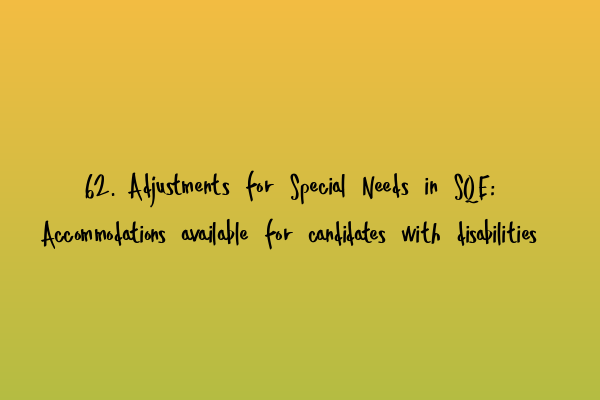62. Adjustments for Special Needs in SQE: Accommodations available for candidates with disabilities
Welcome to our blog post on an important topic: Adjustments for Special Needs in the Solicitors Qualifying Examination (SQE). In order to create an inclusive and fair assessment process, the SQE offers accommodations for candidates with disabilities. These accommodations aim to ensure that every candidate has an equal opportunity to demonstrate their knowledge and skills.
Understanding the Need for Accommodations
It is crucial to recognize that individuals with disabilities may face certain challenges in the examination process. These challenges could be related to physical, sensory, cognitive, or mental health impairments. The SQE acknowledges this and provides reasonable adjustments to support candidates with disabilities.
When a candidate submits a request for accommodations, their needs are assessed on an individual basis. The SQE board carefully considers the nature of the disability and the specific requirements of the candidate. The goal is to create an environment that allows the candidates to perform at their best without any disadvantages.
Types of Accommodations Available
The SQE offers a range of accommodations to cater to candidates’ diverse needs. Here are some examples:
- Extra Time: Candidates who require additional time due to their disabilities can request extra time. This accommodation allows them to work at their own pace and complete the examination without feeling rushed.
- Assistive Technology: Candidates who rely on assistive technology can bring their own devices to the examination venue. The SQE ensures that the necessary technical arrangements are in place to facilitate the use of such technology.
- Alternative Formats: Candidates with visual impairments can request examination papers in alternative formats, such as large print or Braille. The SQE understands the importance of providing information in accessible formats to ensure equal opportunity.
- Accessible Venues: The SQE takes into consideration the accessibility of examination venues. They strive to select venues that have appropriate facilities for candidates with mobility impairments or other accessibility requirements.
These accommodations are just a few examples of how the SQE assists candidates with disabilities. The aim is to create an environment that allows all candidates to showcase their abilities and knowledge without being hindered by their disabilities.
How to Request Accommodations
If you are a candidate with a disability and require accommodations for the SQE, it is important to follow the correct procedure. You should start by contacting the SQE board well in advance of the examination date. They will provide you with the necessary forms and guidance to submit your request.
It is essential to provide relevant and accurate information about your disability and the specific accommodations you require. This will enable the SQE board to assess your needs and make appropriate arrangements. Remember, the more detailed and specific your request, the better they can tailor the accommodations to your needs.
You should also keep in mind that the SQE board may require additional documentation, such as medical reports or assessments, to support your request. Make sure to provide these documents promptly to avoid any delays in the process.
Ensuring Fairness and Integrity
The SQE is committed to maintaining the integrity of the examination process while accommodating candidates with disabilities. The accommodations provided are designed to level the playing field, not to give any candidate an unfair advantage.
The SQE board reviews each accommodation request carefully, considering the impact on test validity and fairness. They ensure that the adjustments do not compromise the assessment’s essential requirements. This meticulous approach ensures that the examination remains a valid and reliable measure of a candidate’s competence.
Conclusion
Understanding the availability of adjustments for special needs in the SQE is crucial for candidates with disabilities. By providing accommodations, the SQE aims to create a level playing field and ensure equal opportunities for all candidates. If you require accommodations, make sure to follow the necessary procedures and provide accurate information to support your request.
To explore other topics related to the SQE, check out these related articles:
